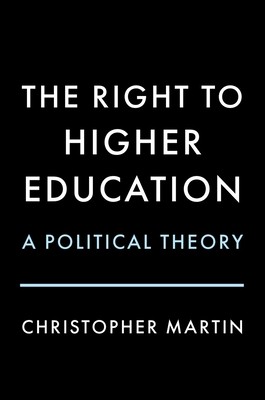
- We will send in 10–14 business days.
- Author: Christopher Martin
- Publisher: Oxford University Press, USA
- ISBN-10: 0197612911
- ISBN-13: 9780197612910
- Format: 14.7 x 21.8 x 2.5 cm, kieti viršeliai
- Language: English
- SAVE -10% with code: EXTRA
Reviews
Description
Many assume that a person's right to education terminates with high school, and that higher education is a luxury addition. The conversation about education changes in palpable ways once we focus on higher education rather than the education we ordinarily think that citizens are due when they are children and teenagers. We see more talk about competition for university places, standardized testing, and elite admissions. We parse out the differences between the benefits of education for the individual and the burdens of public financial support for such an education. The move from educational provision for children to educational provision for adults marks a troubling transformation in this public conversation: from one about how it can improve the lives of all individuals, to one preoccupied with fairness, competition, merit, personal responsibility, and the sharing of benefits and burdens. Problems of status, stratification, and selectivity capture as much, if not more, of our
attention than the question of what higher education institutions should aim to achieve. But why should it be so different, when it is no less essential? Obtaining a higher education degree can change the course of a person's life, providing them with vast opportunities that they could not access otherwise--in fact for many it is a prerequisite for fulfilling their personal and professional goals, or even being able to just make a living. Yet it is almost always framed as privilege, not a right--and a privilege many spend years or even decades paying for after their studies have ended. Our higher education systems are built on the presumption that this is all as it should be: that pursuing higher education is a choice some people make, but not something to which all of us are entitled.
EXTRA 10 % discount with code: EXTRA
The promotion ends in 21d.07:16:42
The discount code is valid when purchasing from 10 €. Discounts do not stack.
- Author: Christopher Martin
- Publisher: Oxford University Press, USA
- ISBN-10: 0197612911
- ISBN-13: 9780197612910
- Format: 14.7 x 21.8 x 2.5 cm, kieti viršeliai
- Language: English English
Many assume that a person's right to education terminates with high school, and that higher education is a luxury addition. The conversation about education changes in palpable ways once we focus on higher education rather than the education we ordinarily think that citizens are due when they are children and teenagers. We see more talk about competition for university places, standardized testing, and elite admissions. We parse out the differences between the benefits of education for the individual and the burdens of public financial support for such an education. The move from educational provision for children to educational provision for adults marks a troubling transformation in this public conversation: from one about how it can improve the lives of all individuals, to one preoccupied with fairness, competition, merit, personal responsibility, and the sharing of benefits and burdens. Problems of status, stratification, and selectivity capture as much, if not more, of our
attention than the question of what higher education institutions should aim to achieve. But why should it be so different, when it is no less essential? Obtaining a higher education degree can change the course of a person's life, providing them with vast opportunities that they could not access otherwise--in fact for many it is a prerequisite for fulfilling their personal and professional goals, or even being able to just make a living. Yet it is almost always framed as privilege, not a right--and a privilege many spend years or even decades paying for after their studies have ended. Our higher education systems are built on the presumption that this is all as it should be: that pursuing higher education is a choice some people make, but not something to which all of us are entitled.


Reviews